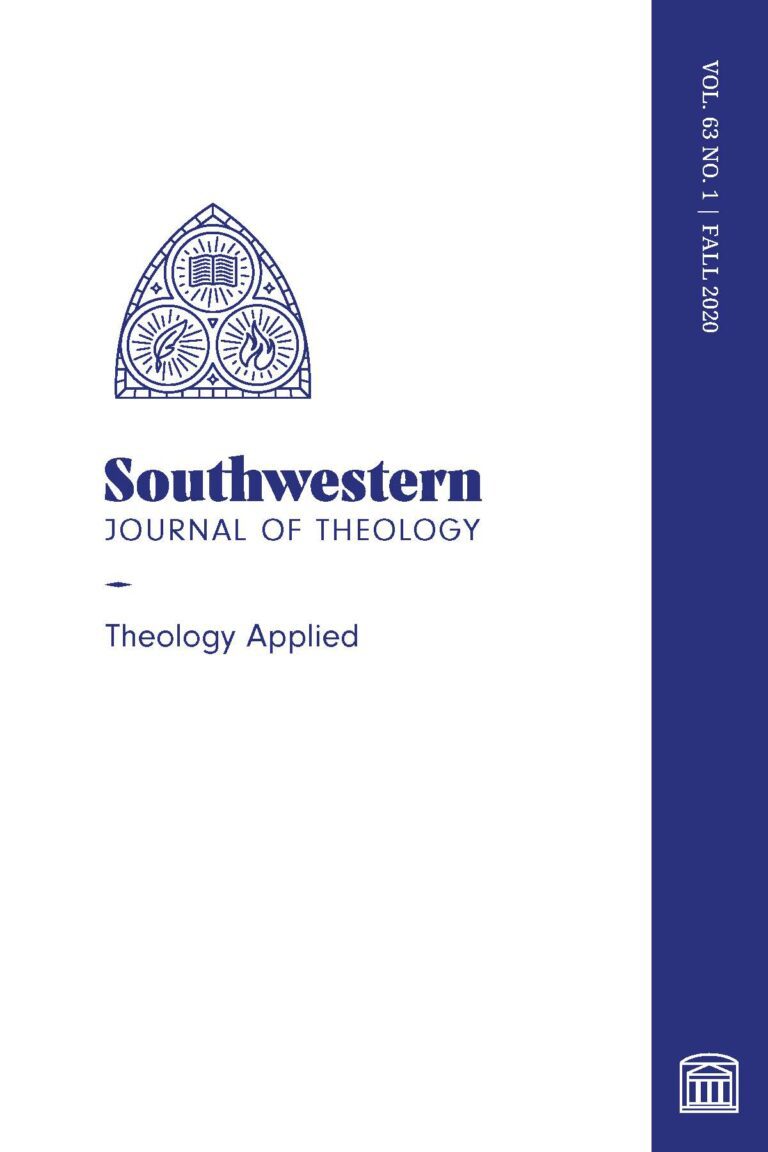
Theology Applied
Southwestern Journal of Theology
Volume 63, No. 1 – Fall 2020
Editor: David S. Dockery
By Christopher W. Morgan and Robert A. Peterson. Nashville: B&H, 2020, 624pp., $49.99
Chris Morgan, dean of the School of Christian Studies at California Baptist University, has provided Christ’s church with a gift in his Christian Theology: The Biblical Story and Our Faith. Written with Robert Peterson, Morgan’s one-volume systematic theology should be the go-to introduction for evangelical Christians, and especially for Baptists and other credobaptists, to the discipline. While other popular one-volume systematic theologies will surely continue to be read and used profitably, Morgan’s new text can be considered the gold standard for evangelical, credobaptist, single-volume introductions to Christian theology.
Several unique features of Morgan’s book catapult it to the top of the list, but most significant is its incorporation of biblical theology to the task of systematic theology. Morgan, with contributions from Peterson, discusses each major Christian doctrine in the context of “the biblical story line of creation, fall, redemption, and new creation” (p. 1). While other recent systematic texts give credence to the grand narrative of Scripture and its importance for theology, Morgan and Peterson’s is among the first, especially within a Baptist context, to do so considering each doctrine rather than merely as prolegomena.
In addition to this thoroughgoing biblical-theological approach, Morgan and Peterson also make sure to discuss each doctrine’s exegetical basis from select passages of Scripture, each doctrine’s impact on the life of the individual believer and on the whole church, and each doctrine’s place in the Christian tradition and its relation to classic Christian confessions of faith. Fundamentally, Morgan and Peterson describe their work as “evangelical, written with a high view of Scripture and consistent with historic confessions of faith” (p. 1). In other words, in Christian Theology we have a single-volume, single-author (by which I mean, not an edited, multi-authored text) introduction to systematic theology that is grounded in an inerrant and fully authoritative view of Scripture, rooted in and faithful to the best of the Christian tradition, shaped by the biblical story, and aimed at the life of the believer and the health of the church. And, to top it off, this book is imminently readable and accessible.
These characteristics, and particularly their combination, sets Morgan and Peterson’s text apart from other one-volume systematic theologies currently used by evangelicals, and particularly by evangelical credobaptists. On the one hand, the fact that this volume is not an edited, multi-authored text gives it a coherence that is not always evident in volumes with multiple contributors from various theological backgrounds and with various theological commitments. On the other hand, among single-authored systematics popular in evangelical circles, Morgan and Peterson are unique in their combined emphasis on exegetical rationale, context in the biblical story, and relation to the Christian tradition for each doctrine. Other single-authored systematics, and especially those used by credobaptists, often lack significant engagement with one or more of these important aspects of the task of systematic theology, whereas Morgan and Peterson consistently emphasize the necessity of all three.
Although Christian Theology is, in my estimation, the gold standard for evangelical, credobaptist, single-volume systematic theologies, I should also note that this is an introduction to the discipline. There are aspects of the discussion of each doctrine that could be expanded, especially as it relates to exegetical basis, historical context, and dogmatic location. Regarding the first two, this is simply a matter of proliferating the foundational work that Morgan and Peterson already provide in their chapters. In other words, there is always more to say about the biblical basis for a doctrine and its place in Christian history and thought.
However, regarding the third – dogmatic location – readers should be aware that Christian Theology only engages in basic dogmatic questions when it comes to most doctrines. For instance, regarding the doctrine of the Trinity, the authors are clear that God is one God who exists in three Persons, and they even refer to the eternal relations of origin (pp. 102–103). When it comes to explaining the latter concept and its biblical basis, however, there is little discussion. The emphasis, as Morgan and Peterson state in the introduction, is on the most basic affirmations of the Christian faith. The same could be said, for example, of mentions of the doctrine of simplicity (p. 102) and of the heresy of Apollinarianism. With respect to the former, there is only passing reference, while with the latter the authors define the heresy’s meaning but without mention of the doctrine of dyothelitism or its relation to the doctrine of the Trinity. I want to emphasize that these observations are not criticisms, but only intended to highlight the introductory nature of the text. For those who taste and see the beauty of the discipline of systematic theology after reading Christian Theology, more work will be required to plumb the dogmatic depths of the doctrines discussed. Again, this aspect of the book is noted by the authors, and each chapter contains a list of resources for further reading to aid those who wish to explore further.
In summary, Christian Theology is a highly accessible, readable introduction to the Christian faith that is at once academically stimulating and devotionally engaging, a rare single-volume systematic that gives proper attention to exegesis, biblical theology, historical theology, and ecclesial application. It should be used in churches and classrooms alike. I cannot recommend it highly enough.





